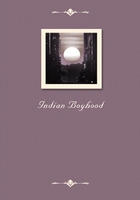
第3章
This mode of travelling for children was possi-ble only in the summer,and as the dogs were some-times unreliable,the little ones were exposed to a certain amount of danger.For instance,when-ever a train of dogs had been travelling for a long time,almost perishing with the heat and their heavy loads,a glimpse of water would cause them to forget all their responsibilities.Some of them,in spite of the screams of the women,would swim with their burdens into the cooling stream,and I was thus,on more than one occasion,made to partake of an unwilling bath.
I was a little over four years old at the time of the "Sioux massacre"in Minnesota.In the general turmoil,we took flight into British Columbia,and the journey is still vividly remem-bered by all our family.A yoke of oxen and a lumber-wagon were taken from some white farmer and brought home for our conveyance.
How delighted I was when I learned that we were to ride behind those wise-looking animals and in that gorgeously painted wagon!It seemed almost like a living creature to me,this new vehicle with four legs,and the more so when we got out of axle-grease and the wheels went along squealing like pigs!
The boys found a great deal of innocent fun in jumping from the high wagon while the oxen were leisurely moving along.My elder brothers soon became experts.At last,I mustered up courage enough to join them in this sport.I was sure they stepped on the wheel,so I cautiously placed my moccasined foot upon it.Alas!before I could realize what had happened,I was under the wheels,and had it not been for the neighbor immediately behind us,I might have been run over by the next team as well.
This was my first experience with a civilized vehicle.I cried out all possible reproaches on the white man's team and concluded that a dog-travaux was good enough for me.I was really rejoiced that we were moving away from the people who made the wagon that had almost ended my life,and it did not occur to me that Ialone was to blame.I could not be persuaded to ride in that wagon again and was glad when we finally left it beside the Missouri river.
The summer after the "Minnesota massacre,"
General Sibley pursued our people across this river.Now the Missouri is considered one of the most treacherous rivers in the world.Even a good modern boat is not safe upon its uncertain current.We were forced to cross in buffalo-skin boats--as round as tubs!
The Washechu (white men)were coming in great numbers with their big guns,and while most of our men were fighting them to gain time,the women and the old men made and equipped the temporary boats,braced with ribs of willow.
Some of these were towed by two or three women or men swimming in the water and some by ponies.
It was not an easy matter to keep them right side up,with their helpless freight of little children and such goods as we possessed.
In our flight,we little folks were strapped in the saddles or held in front of an older person,and in the long night marches to get away from the soldiers,we suffered from loss of sleep and insuf-ficient food.Our meals were eaten hastily,and sometimes in the saddle.Water was not always to be found.The people carried it with them in bags formed of tripe or the dried pericardium of animals.
Now we were compelled to trespass upon the country of hostile tribes and were harassed by them almost daily and nightly.Only the strictest vigilance saved us.
One day we met with another enemy near the British lines.It was a prairie fire.We were sur-rounded.Another fire was quickly made,which saved our lives.
One of the most thrilling experiences of the following winter was a blizzard,which overtook us in our wanderings.Here and there,a family lay down in the snow,selecting a place where it was not likely to drift much.For a day and a night we lay under the snow.Uncle stuck a long pole beside us to tell us when the storm was over.
We had plenty of buffalo robes and the snow kept us warm,but we found it heavy.After a time,it became packed and hollowed out around our bodies,so that we were as comfortable as one can be under those circumstances.
The next day the storm ceased,and we discovered a large herd of buffaloes almost upon us.
We dug our way out,shot some of the buffaloes,made a fire and enjoyed a good dinner.
I was now an exile as well as motherless;yet Iwas not unhappy.Our wanderings from place to place afforded us many pleasant experiences and quite as many hardships and misfortunes.There were times of plenty and times of scarcity,and we had several narrow escapes from death.In sav-age life,the early spring is the most trying time and almost all the famines occurred at this period of the year.
The Indians are a patient and a clannish people;their love for one another is stronger than that of any civilized people I know.If this were not so,I believe there would have been tribes of cannibals among them.White people have been known to kill and eat their companions in preference to starving;but Indians--never!
In times of famine,the adults often denied themselves in order to make the food last as long as possible for the children,who were not able to bear hunger as well as the old.As a people,they can live without food much longer than any other nation.
I once passed through one of these hard springs when we had nothing to eat for several days.Iwell remember the six small birds which consti-tuted the breakfast for six families one morning;and then we had no dinner or supper to follow!
What a relief that was to me--although I had only a small wing of a small bird for my share!Soon after this,we came into a region where buffaloes were plenty,and hunger and scarcity were for-gotten.